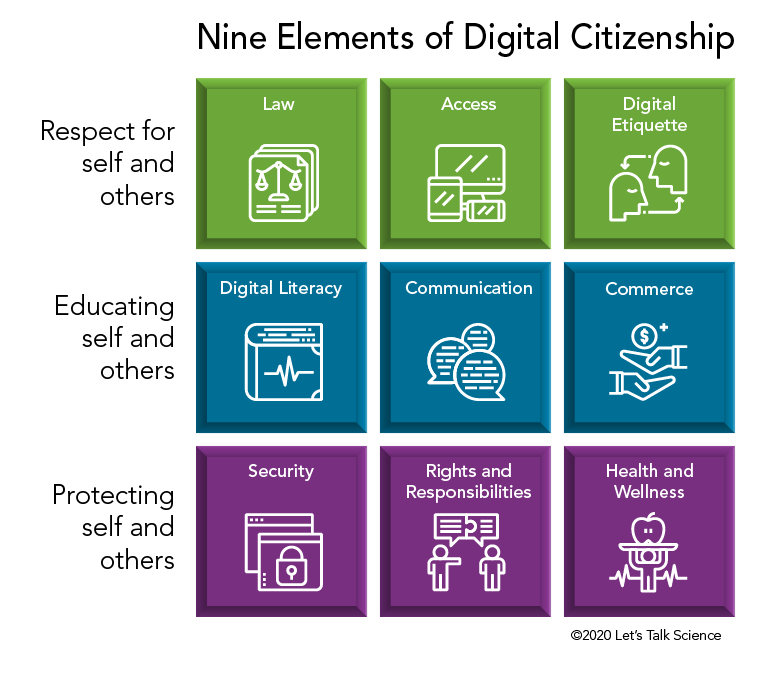Get your elbows off the tables, stop yelling at each other we are in the car, don’t wear your hat in the house….All things I’ve been told many times growing up, as well as referenced numerous times as a parent. What does it boil down to? Etiquette and manners. When I think about how I go about teaching Digital Citizenship in my classes and in dealing with my own children, Mike Ribble’s “Nine Elements of a Digital Citizenship” provides a great jump off point to reference.

Are you a good digital citizen?
The first thing I always talk about with my classes, is in reference to the Golden Rule: Treat others like you would like to be treated. It doesn’t matter the setting- school, sports, church, Grandma’s house…Every arena or space you step in has its own written or unwritten “Code of Conduct.” Navigating online spaces is no different. Similar to our school beliefs, we want students to be respectful, responsible, feel safe, and have the ability to develop and build relationships with one another. It doesn’t matter the location, I feel all parents would agree that they want these things for their children.
In keeping with Ribble’s 9 elements, most issues I have with technology and digital literacy can be traced back to a lack of understanding or deliberate breaking of the principles. Whether it be an overuse of AI to plagiarize an assignment, or a complete old school copy and paste, students have to be held accountable to the information they are presenting or discussing in the online world. By holding them accountable, students can show us their critical thinking, and thought process behind their ideas and work. My struggle is always being able to teach them the proper way to comb through search results and find valid information. They want the quick fix and sometimes don’t understand the information they are regurgitating isn’t factual. Ironically, they are quick to jump on classmates posts, or ideas, if they know the information is incorrect. Once again, hopefully they can do it respectfully but much of the time that’s not the case. Rude or negative comments, said or written, are often the first thing out of their mouths or their keyboards.
Are we safe online?
This week I had a student ask me a question during one of my rants about the misuse of Snapchat whether they are safe using apps like that. Yes, I have it and I use it, I just don’t think 10 year-olds need to have access to it without proper guidance on how to use. We discussed different reasons they might be at risk using messaging apps or making posts, and once again it came back to proper etiquette. If you are properly using these apps, and social media sites, respectfully and responsibly, then the risk of having issues is quite low. Know the information you are sharing, know that is it going to be out there for all to see, and most importantly know who you are exactly sharing that information with.
And once again, my oldest child will be mad because he isn’t getting that cell phone for his birthday. It’s not I don’t think he could handle it, it’s more that I see his peers having so many issues that why would I put him in that position as a parent. Unitl next time, use those manners!


Graeme, I love that you brought up a comparison to the golden rule. I think that is an apt connection as the more we have discussed digital citizenship the more I have seen that it is really an extension of regular citizenship. Being an active, engaged, and participating citizen extends not just only to the “real world” but also to the digital realm. And using something as simple as the Golden Rule is a great way to create a jumping off point.
Thanks for the reply Cole. It’s something students have heard also from their first years in school. Be nice to everyone, and treat them like you’d want to be. Goes a long way in life in general!
In the first 2 sentences of your post, I immediately thought of Cole’s post about the “real world”. The digital world needs to be taken seriously and the public needs to change their mindset that it IS the real world and nobody should behave any differently online than they do in person. If you wouldn’t say it to someone’s face then don’t say it online. I agree that the manners and etiquette we were taught as children haven’t changed but that they should now extend to the online domain and be taught from the beginning. If we instill those habits from a young age to be utilized no matter when and where a person is then perhaps digital citizenship will become a household norm.
I often see a divide in my middle school classrooms between students who clearly have access to technology on a regular basis and those who do not. You can tell who knows the app features and who has no idea what the others are talking about. With each new year and a new set of students, I’m always curious to see how many parents will have allowed digital access and which do not or strictly regulate it. Which is better? Allowing early access so they gain fluency and early appropriate citizenship or wait? I’m sure both have their pros and cons but I think it changes daily with the addition of new tech all the time.
Thanks for the comment RoxAnne! It is fairly evident in my classes as well, who has access to the tech and who doesn’t. Some students can whiz through material or navigate apps, where others struggle. I feel early exposure to tech is beneficial, but it needs to be closely monitored until expectations are understood by the users, both at school and at home.
I agree completely, Graeme. We need to have manners no matter where we are (online or offline). Digital citizenship is topic that is not taught very well to children and adults. Manners and etiquette in general is something that everyone, young and old need to practice. That is why Digital Citizenship should be taught explicitly to students whether it be at home or at school.
Thanks for the comment Shella. My issue is that some do such a great job of teaching Digital Citizenship where others don’t, or they do not understand where to go for the information to teach it properly. I know some divisions used to have digital/tech positions where someone was responsible for sharing resources and teaching to these topics, but with budget cuts most are no longer something available to staff or students.